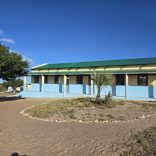Mozambique: Frelimo engages with striking teachers in Chimoio
Mozambique: Civil society organisations support Josina Machel

Image: Twitter / @Sajokm
Mozambican women’s organisations, and several other civil society bodies, have condemned the Higher Appeals Court for its “unjust and irresponsible” ruling which acquitted the man accused of a savage assault on Josina Machel, daughter of the country’s first President, Samora Machel, in which she was blinded in one eye.
POSICIONAMENTO DAS OSC’s SOBRE O ACÓRDÃO DO TRIBUNAL DE RECURSO
Caso Josina Machel Vs. Rofino Licuco.
Leia o documento completo no link abaixo: https://t.co/1d5ZwVi29A pic.twitter.com/5bGBJ7a5CX
— CESC Moçambique (@CescMoz) July 4, 2020
27 organisations signed the letter, published in Monday’s issue of the independent newssheet “Carta de Mocambique”, decrying the Appeal Court’s ruling as “incomprehensible”, and with serious implications for future cases of domestic violence. Among the signatories are the Women’s Forum (a coalition of organisations working in defence of women), the Forum of Community Radios (Forcom), and the Community Development Foundation (FDC).
The attack on Josina occurred in October 2015. The man accused of the assault, businessman Rufino Licuco, had been in a relationship with her for three years.
The case came to trial in February 2017, and the Maputo City Court found Licuco guilty of assault and of domestic and psychological violence. The court sentenced him to a prison term of three years and four months, suspended for five years – on condition that Licuco pay his victim damages of over 200.6 million meticais (about 2.9 million US dollars at today’s exchange rates). Rather than pay up, Licuco appealed, and the verdict of the Higher Appeals Court became known last month.
The appeals judges quashed the sentence of the lower court. One of the grounds for the appeal was that there were no witnesses to the assault – which is, of course, true for most cases of domestic violence.
The civil society organisations noted that, although equality of rights between men and women has been enshrined in every Mozambican constitution since independence in 1975, “it was necessary to fight to guarantee equal rights within the family, and to deconstruct domestic violence as a ‘normal’ situation, revealing its true criminal nature”.
Civil society also had to “impose the idea that citizenship does not end at the door of the home”. After years of debates and demonstrations, a law on domestic violence was eventually passed in the country’s parliament, the Assembly of the Republic, in 2009. Despite its shortcomings, the civil society letter continued, the law “made it clear that, for the Mozambican state, it is unacceptable to treat women as second class citizens, subordinate to men, with the power to use physical coercion as a means of controlling them”.
But, on its own, that law was not enough, “since it was still necessary to fight against the prejudices, not only of the public at large, but also of some policemen, prosecutors and judges who did not agree with the values expressed in the 2009 law”.
“They were reluctant to apply it”, the organisations continued, “or they invented creative solutions so as not to punish crimes of domestic violence”. So the attitude of the Appeals Court judges “does not surprise us. We have become used to facing such resistance”.
“What justice is there for women?”, the letter asked. “What rights do they have? Was the liberation that came with independence only for men? We need them to explain to us: how can one be free, while fearing constantly for one’s physical integrity and for one’s life?”
The disservice which the judges have done to women’s rights, it adds, “is a sinister and unworthy mark, and thus merits the repudiation and indignation of all of society, in defence of the rule and primacy of law, which are inalienable values of the State that we are building, so that the promises of June (i.e. 25 June, the date of independence) continue to shine for all Mozambican women and men”.
The organisations promise they will continue fighting “to ensure justice for Josina Machel, and for all women who are victims of daily assaults at the hands of those from whom they should receive support, help and solidarity”.
Josina Machel from Mozambique, the face of physical gender based violence. #TimeIsNow #SVRIForum2019 pic.twitter.com/5Oo5yqRLV6
— Lusajo Kajula (@Sajokm) October 22, 2019












Leave a Reply
Be the First to Comment!
You must be logged in to post a comment.
You must be logged in to post a comment.